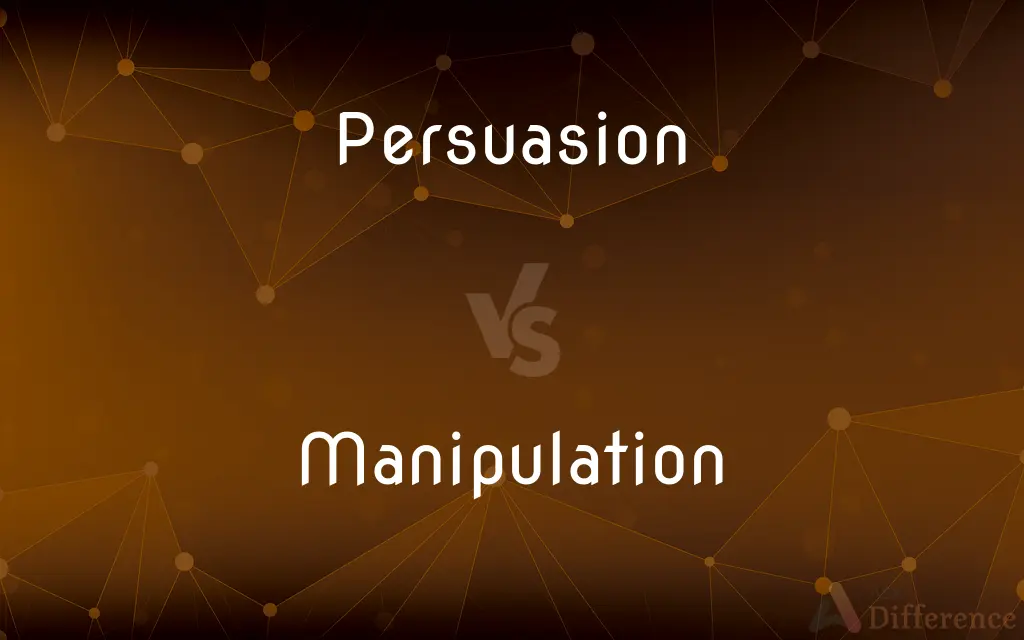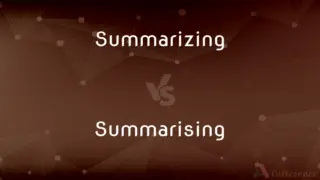Persuasion vs. Manipulation — What's the Difference?
Edited by Tayyaba Rehman — By Fiza Rafique — Published on October 2, 2023
Persuasion is influencing others through reasoning or appeal to win agreement, while manipulation is controlling or influencing others deceptively or unfairly to serve one's own interests.

Difference Between Persuasion and Manipulation
Table of Contents
ADVERTISEMENT
Key Differences
Persuasion and manipulation are both means of influencing others, but they differ in intent and methodology. Persuasion is about communicating openly and relying on facts, logic, or emotions to sway someone's opinion or behavior willingly. On the other hand, manipulation involves using deceptive tactics or exploiting someone to achieve a specific outcome, often without their full awareness or consent.
Ethical considerations set persuasion and manipulation apart. Persuasion is generally seen as a positive or neutral form of influence because it respects the autonomy of the individual. It provides them with the information or perspective they might not have considered. Conversely, manipulation is typically viewed in a negative light, as it often involves deceit, coercion, or taking advantage of someone's vulnerabilities.
The outcomes of persuasion and manipulation can also differ. Successful persuasion results in someone making an informed decision based on understanding or empathy. In contrast, manipulation leads to outcomes that primarily benefit the manipulator, sometimes at the expense of the manipulated party.
While persuasion is built on trust and mutual respect, manipulation erodes these foundations. When someone realizes they've been manipulated, it can lead to feelings of betrayal and mistrust, potentially damaging the relationship. In contrast, even if persuasion doesn't achieve its intended outcome, it can still foster understanding and respect between parties.
In various contexts, such as advertising, politics, or personal relationships, the line between persuasion and manipulation can blur. It's essential to remain aware of the techniques being used and the intentions behind them to differentiate between genuine persuasion and subtle manipulation.
ADVERTISEMENT
Comparison Chart
Intent
Genuine intent to influence through logic or emotion
Often self-serving with deceptive or coercive tactics
Ethical Considerations
Generally positive/neutral, respecting individual autonomy
Viewed negatively due to deceit or exploitation
Outcome
Informed decision by the influenced party
Outcomes primarily benefiting the manipulator
Trust Factor
Built on trust and mutual respect
Can erode trust and damage relationships
Awareness
The influenced party is aware and consents
The influenced may not fully realize or consent
Compare with Definitions
Persuasion
Effective communication that seeks to win someone over.
His art of persuasion made him an excellent salesperson.
Manipulation
Controlling or influencing someone deceptively or unfairly.
She was wary of his actions, sensing manipulation at play.
Persuasion
Relying on facts, logic, or emotions to sway someone willingly.
She used the power of persuasion to rally supporters for her cause.
Manipulation
Exploiting someone's weaknesses or emotions to achieve a specific outcome.
The con artist's manipulation preyed on the elderly woman's trust.
Persuasion
Persuasion or persuasion arts is an umbrella term of influence. Persuasion can attempt to influence a person's beliefs, attitudes, intentions, motivations, or behaviors.Propaganda is a form of persuasion used to persuade a large audience using for the purposes of the individual or group producing the propaganda.
Manipulation
The skillful handling or operation of something, sometimes with negative connotations.
His manipulation of the data led to skewed results.
Persuasion
The act of persuading or the state of being persuaded
"The persuasion of a democracy to big changes is at best a slow process" (Harold J. Laski).
Manipulation
A tactic that can lead to outcomes primarily benefiting the user.
The politician's manipulation of public sentiment was evident.
Persuasion
The ability or power to persuade
"Three foremost aids to persuasion which occur to me are humility, concentration, and gusto" (Marianne Moore).
Manipulation
The act or practice of manipulating.
Persuasion
A strongly held opinion; a conviction
"He had a strong persuasion that Likeman was wrong" (H.G. Wells).
Manipulation
The state of being manipulated.
Persuasion
A body of religious beliefs; a religion
Worshipers of various persuasions.
Manipulation
Shrewd or devious management, especially for one's own advantage.
Persuasion
A party, faction, or group holding to a particular set of ideas or beliefs.
Manipulation
The practice of manipulating or the state of being manipulated.
The dealer's manipulations could have removed cards from the deck.
Persuasion
(Informal) Kind; sort
"the place where ... rockers of any gender or persuasion can become megastars" (Christopher John Farley).
Manipulation
The skillful use of the hands in, for example, chiropractic.
After a few minutes of manipulation each week, she obtained days of relief from her neck pain.
Persuasion
The act of persuading, or trying to do so; the addressing of arguments to someone with the intention of changing their mind or convincing them of a certain point of view, course of action etc.
Manipulation
The usage of psychological influence over a person, event, or situation to gain a desired outcome.
The counselor was able to reach the disturbed teen through positive psychological manipulation.
Through subtle manipulations he orchestrated the downfall of his rival.
Persuasion
An argument or other statement intended to influence one's opinions or beliefs; a way of persuading someone.
Manipulation
The act or process of manipulating, or the state of being manipulated; the act of handling work by hand; use of the hands, in an artistic or skillful manner, in science or art.
Manipulation is to the chemist like the external senses to the mind.
Persuasion
A strongly held conviction, opinion or belief.
It is his persuasion that abortion should never be condoned.
Manipulation
The use of the hands in mesmeric operations.
Persuasion
One's ability or power to influence someone's opinions or feelings; persuasiveness.
Manipulation
Artful management; as, the manipulation of political bodies; sometimes, a management or treatment for purposes of deception or fraud.
Persuasion
A specified religious adherence, a creed; any school of thought or ideology.
Manipulation
Exerting shrewd or devious influence especially for one's own advantage;
His manipulation of his friends was scandalous
Persuasion
Another personal, animal or inanimate trait that is not (very) liable to be changed by persuasion, such as sex, gender, ethnicity, origin, profession or nature.
Manipulation
The action of touching with the hands or the skillful use of the hands
Persuasion
The act of persuading; the act of influencing the mind by arguments or reasons offered, or by anything that moves the mind or passions, or inclines the will to a determination.
For thou hast all the arts of fine persuasion.
Manipulation
Achieving one's goals by using subtle, indirect, or deceptive tactics.
He was notorious for his manipulation in the corporate world.
Persuasion
The state of being persuaded or convinced; settled opinion or conviction, which has been induced.
If the general persuasion of all men does so account it.
My firm persuasion is, at least sometimes,That Heaven will weigh man's virtues and his crimesWith nice attention.
Persuasion
A creed or belief; a sect or party adhering to a certain creed or system of opinions; as, of the same persuasion; all persuasions are agreed.
Of whatever state or persuasion, religious or political.
Persuasion
The power or quality of persuading; persuasiveness.
Is 't possible that my deserts to youCan lack persuasion?
Persuasion
That which persuades; a persuasive.
Persuasion
The act of persuading (or attempting to persuade); communication intended to induce belief or action
Persuasion
A personal belief or judgment that is not founded on proof or certainty;
My opinion differs from yours
What are your thoughts on Haiti?
Persuasion
Inducement to act by argument or reasoning or entreaty
Persuasion
The act of influencing someone's beliefs or actions through reasoning.
Her persuasion skills convinced the team to adopt the new strategy.
Persuasion
Encouraging change based on mutual understanding or empathy.
Through gentle persuasion, he was able to resolve the conflict.
Persuasion
A positive or neutral form of influence respecting the individual's autonomy.
The charity used persuasive tactics to raise awareness and funds.
Common Curiosities
Relying on facts, logic, or emotions to sway someone willingly.
She used the power of persuasion to rally supporters for her cause.
A positive or neutral form of influence respecting the individual's autonomy.
The charity used persuasive tactics to raise awareness and funds.
Can manipulation ever be positive?
While often negative, manipulation can be seen in positive light in certain contexts, like skillfully handling a situation, but intent matters.
The act of influencing someone's beliefs or actions through reasoning.
Her persuasion skills convinced the team to adopt the new strategy.
Can a person use both persuasion and manipulation simultaneously?
Yes, the lines can blur, especially if someone uses genuine information but with some deceptive tactics.
Effective communication that seeks to win someone over.
His art of persuasion made him an excellent salesperson.
Encouraging change based on mutual understanding or empathy.
Through gentle persuasion, he was able to resolve the conflict.
Are persuasive techniques transparent?
Typically, yes. Persuasion involves open communication, making the influenced party aware of the intent.
Does manipulation always involve deceit?
Often, but not always. Manipulation primarily involves tactics that serve the manipulator's interests, which can be deceptive or simply exploitative.
What's a common sign of manipulation?
Feeling pressured, uncomfortable, or sensing hidden agendas can indicate manipulation.
Why is trust important in persuasion?
Trust fosters an open environment where persuasion can be more effective and mutually respectful.
What is the main difference between persuasion and manipulation?
Persuasion is influencing through reasoning or appeal, while manipulation is deceptive or unfair influence for self-interest.
Is persuasion always ethical?
Persuasion is generally seen as ethical when it respects the individual's autonomy and provides genuine information or perspective.
Can you persuade someone without them knowing?
Persuasion involves open communication, so the individual is generally aware, but subtle forms of persuasion might not be immediately recognized.
In which contexts is persuasion most commonly used?
Sales, marketing, negotiations, and public speaking often employ persuasion techniques.
Are all manipulators aware they are manipulating?
Not necessarily. Some might believe they're merely being persuasive or don't recognize their own manipulative behaviors.
Are advertisements more persuasive or manipulative?
It varies. While many ads persuade with genuine information, some might manipulate by playing on emotions or presenting misleading data.
Can manipulation be detected easily?
Not always. Skilled manipulators can be subtle, making it crucial to stay aware and question intentions.
Is manipulation always intentional?
Mostly, but individuals might unconsciously use manipulative tactics learned from past experiences.
How can one differentiate between being persuaded and manipulated?
Reflecting on intent, transparency, and outcome can help differentiate, with manipulation often being more self-serving and less transparent.
Share Your Discovery

Previous Comparison
Graphic Novel vs. Comic
Next Comparison
Summarizing vs. SummarisingAuthor Spotlight
Written by
Fiza RafiqueFiza Rafique is a skilled content writer at AskDifference.com, where she meticulously refines and enhances written pieces. Drawing from her vast editorial expertise, Fiza ensures clarity, accuracy, and precision in every article. Passionate about language, she continually seeks to elevate the quality of content for readers worldwide.
Edited by
Tayyaba RehmanTayyaba Rehman is a distinguished writer, currently serving as a primary contributor to askdifference.com. As a researcher in semantics and etymology, Tayyaba's passion for the complexity of languages and their distinctions has found a perfect home on the platform. Tayyaba delves into the intricacies of language, distinguishing between commonly confused words and phrases, thereby providing clarity for readers worldwide.
















































